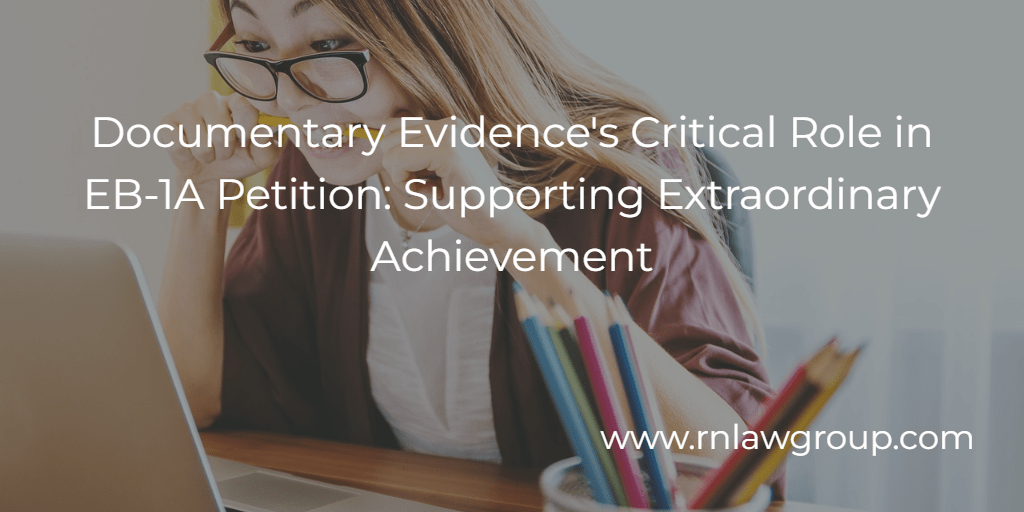
Documentary Evidence’s Critical Role in EB-1A Petition: Supporting Extraordinary Achievement
The EB-1A employment-based immigration visa can appear to be a daunting process. An applicant must either show proof of a one-time achievement (major internationally-recognized award) meet 3 of the 10 listed criteria:
- Evidence of receipt of lesser nationally or internationally recognized prizes or awards for excellence
- Evidence of your membership in associations in the field which demand outstanding achievement of their members
- Evidence of published material about you in professional or major trade publications or other major media
- Evidence that you have been asked to judge the work of others, either individually or on a panel
- Evidence of your original scientific, scholarly, artistic, athletic, or business-related contributions of major significance to the field
- Evidence of your authorship of scholarly articles in professional or major trade publications or other major media
- Evidence that your work has been displayed at artistic exhibitions or showcases
- Evidence of your performance of a leading or critical role in distinguished organizations
- Evidence that you command a high salary or other significantly high remuneration in relation to others in the field
- Evidence of your commercial successes in the performing arts
These criteria can make even very well qualified candidates nervous about their eligibility, but with the right experience, the right lawyer, and a little luck, an applicant can have their Green Card in as little as three months. This series of articles will provide a background on each of the 10 criteria, examples of documents that can meet them, and common pitfalls to avoid.
The EB-1A visa category is intended to draw people to the US who have exceptional talent in the arts, sciences, business, education, or athletics. Documentary proof is a crucial component of the application procedure for supporting claims of outstanding achievement. This article examines the value of supporting documentation in EB-1A petitions and demonstrates how having a strong case can increase an applicant’s chances of receiving this prized visa.
Building Extraordinary Ability:
An applicant must offer convincing proof of their outstanding competence in their profession in order to be granted an EB-1A visa. The applicant’s remarkable knowledge, accomplishments, and international recognition must be supported by this evidence. The petitioner’s strong argument is built on the basis of documentary evidence.
Academic proof of an applicant’s standing in their field, such as publications, citations, and research contributions, can be shown. Letters of recommendation from esteemed professionals who can vouch for the petitioner’s efforts should be included with these papers. Credibility is also increased by displaying memberships in illustrious organizations or acting as a judge or reviewer of peers’ work.
Recognition at a National/International Level:
An important feature of an EB-1A petition serves as proof of the petitioner’s prestige on a national or worldwide level. Documentary proof might show how much recognition the petitioner has received, highlighting their extraordinary skills.
Press releases, media attention, and articles that highlight the candidate can attest to their notoriety and exposure. Awards, accolades, and prizes won at the national or worldwide level denote exceptional accomplishments. The petitioner’s status as a thought leader is attested to by invitations to speak at conferences or seminars, involvement on panels, or serving as the keynote speaker at important gatherings
Patents, copyrights, trademarks, or ground-breaking research initiatives can all serve as proof of an applicant’s original contributions to their field. Contracts, licenses, or financial statements that demonstrate the commercial success stemming from their outstanding abilities offer additional evidence of effect and acknowledgment.
High Compensation or Salary:
Another crucial element that can support an EB-1A petition is supporting documentation of significant compensation. Such supporting data demonstrates how a candidate significantly contributes to their field and is thus a benefit to the United States.
Convincing documentation include pay stubs, employment agreements, or letters from employers outlining a high salary or remuneration. They show that the applicant’s skills are in high demand and that they can command high pay for their employment. The assertion that the applicant’s pay is unique may also be supported by comparisons of salaries for professionals holding comparable roles.
Documentary Evidence Critical Evaluation:
It is crucial to assess the documentary evidence critically and present a coherent narrative in order to guarantee the success of an EB-1A petition. This entails gathering and deciding on the most convincing proof of the petitioner’s exceptional talent.
A well-organized petition should start with a concise statement of the applicant’s accomplishments to establish a compelling case. To emphasize the significance of the evidence, it should be presented in a logical order with thorough justifications and background data. Testimonies from renowned people in the field and expert opinions can help to support the argument.
When completing an EB-1A petition, there are various hazards associated with relying primarily on support letters without supplying enough factual evidence. Support letters are crucial in confirming an applicant’s skills and accomplishments, but they might not be enough by themselves to persuade immigration officials of the petitioner’s exceptional potential. The following dangers result from failing to present documentary proof:
Support letters are vital, but they are essentially personal opinions, therefore they might not be as reliable as hard copies of documents. Without supporting evidence, it is difficult to verify the assertions stated in the support letters, which weakens the case as a whole.
Lack of Tangible Proof:
Documentary proof is used to demonstrate a candidate’s achievements, impact, and recognition in their industry. It helps create credibility by offering unbiased confirmation of the petitioner’s qualifications. The statements expressed in support letters could seem unfounded and less persuasive in the absence of such proof.
Insufficient Differentiation:
Documentary proof enables a candidate to distinguish themselves from other candidates in their field. It displays the petitioner’s remarkable accomplishments and contributions and sets them apart from others of average competence. It may be challenging to meet the strict requirements of the EB-1A visa category if you rely just on the applicant’s letters of support.
Limited External Validation:
Documentary proof of an applicant’s accomplishments, such as press coverage, publications, honors, or patents, provides limited external validation. It proves that peers, authorities, and the larger community value and respect the petitioner’s skills. Without such proof, the support letters could not be enough to persuade immigration officials of the applicant’s exceptional abilities.
Increased Review:
Immigration officials may review a case more closely if there is a lack of supporting documentation in an application. To determine the validity of the petitioner’s claims, they could ask for more proof or explanation. This may cause delays in the application’s processing or even a possible rejection if the given evidence is deemed insufficient.
Missed Chance to Support the Case:
Documentary evidence presents a chance to support the position as a whole and address any potential shortcomings. It enables the petitioner to outline all of their accomplishments and show the breadth and depth of their impact. Without such proof, the applicant could be unable to demonstrate key skills, which would reduce their chances of having their petition accepted.
In conclusion, while letters of support are important parts of an EB-1A petition, depending only on them in the absence of substantial factual evidence might be dangerous. Documentary proof offers unbiased confirmation, supports assertions, and improves the entire argument by demonstrating the applicant’s exceptional talent. To increase the likelihood that a petition will be granted, it is crucial to create a balance between supportive letters and meticulously documented facts.
It is impossible to emphasize the significance of supporting documentation in an EB-1A petition. The petitioner’s chances of receiving this distinguished visa are improved by a precisely prepared application that includes extensive proof of outstanding talent. Applicants can demonstrate their significant contributions to their field and their future impact in the United States by convincingly demonstrating extraordinary achievements, national/international recognition, and high compensation. In order to convince immigration policymakers, the evidence must be carefully considered, presented, and supported by a compelling story.
By: Karim Jivani
Karim Jivani is a Special Attention Staff Attorney at Reddy Neumann Brown PC who focuses on employment-based non-immigrant visas. Karim’s practice covers all phases of the visa process including filing petitions, responding to Requests for Evidence (RFE), and drafting motions and appeals. He has completed over 30 RFE’s to date in response to H-1B, L-1, I-140, and VAWA petitions.

